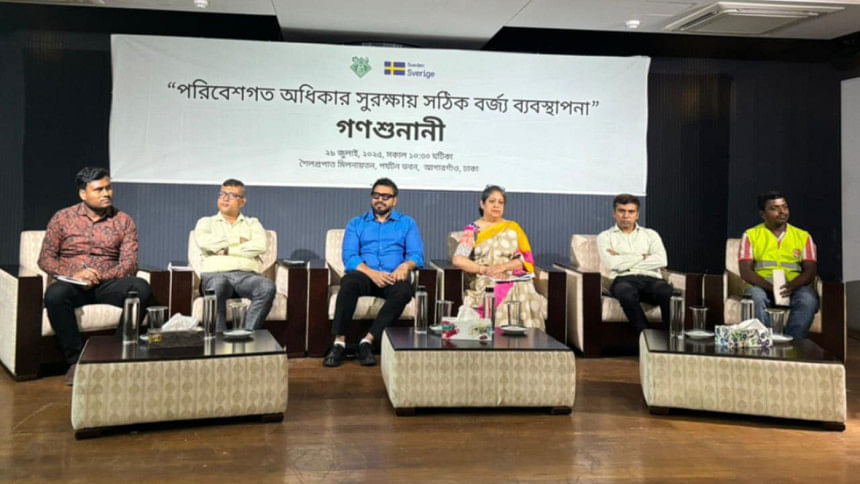Stronger laws, awareness key to tackle city waste

Stronger political will, company accountability, enforcement of legal frameworks, and ensuring the dignity and safety of sanitation workers are essential for effective waste management in and around Dhaka.
These were the core recommendations from a public hearing organised by the Bangladesh Environmental Lawyers Association (Bela) today in the capital.
The event sought to address the realities of waste mismanagement and propose actionable solutions.
Speakers emphasised community involvement, inclusion of women and marginalised groups, waste-to-energy initiatives, and public awareness as critical components of a sustainable approach.
Taslima Islam, BELA's chief executive, said, "Waste management is a human right. Dhaka ranks as one of the world's least livable cities. We need urgent action."
She cited population growth, unplanned urbanisation, inefficient systems, limited recycling, undervaluing sanitation workers, and public irresponsibility as contributing factors.
Methane emissions from the Matuail landfill also pose serious risks, she added.
Maruf Maimin, assistant director of the Department of Environment highlighted legal loopholes and lack of human resources. A zero-waste policy requires integrated efforts and functional disposal systems.
Rajuk's deputy town planner Abu Kawsar called for tougher enforcement, regulation of street vendors, and corporate social responsibility.
Mostafizur Rahman of Waste Concern stressed accountability -- from households to policymakers.
PRISM Bangladesh director Rakib Uddin Bhuiyan said waste management is a shared responsibility.
Dr Jasim Uddin of Dhaka University suggested integrating waste education into curricula and exploring bio-based energy technologies.
Mahbubur Alam, executive engineer at Dhaka South City Corporation, said, "Without citizen awareness, collection and disposal efforts will fall short."
Sanitation worker Mohammad Ali Hossain said people continue dumping waste in streets and drains. "Awareness campaigns are needed, and where PRISM cannot operate, city corporations must act."
Speaking as the chief guest, Mohammad Azaz, administrator of Dhaka North City Corporation, proposed developing policy-based guidelines and a realistic, actionable roadmap.
"The question is: where do we start? We must set short-, mid-, and long-term goals and clearly define responsibilities at the city level."
He emphasised the need for prioritising waste segregation but acknowledged public resistance to locating secondary transfer stations near residences.
Azaz proposed creating "Waste Parks" where private companies can operate and contribute to a formal waste management industry. "We need a unified strategy, increased campaign funding, and long-term planning."
He called for the formation of a dedicated police unit under city corporations to enforce fines and waste management laws -- a proposal already under consideration by DNCC.
Rakibul Hasan, a Keraniganj social worker, and ESDO president Shahriar Hossain also spoke.

 For all latest news, follow The Daily Star's Google News channel.
For all latest news, follow The Daily Star's Google News channel. 



Comments